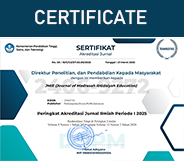INNOVATION OF DIFFERENTIATIONAL LEARNING STRATEGIES IN SCIENCE LEARNING FOR STUDENTS WITH SPECIAL NEEDS
Abstract
Keywords
Full Text:
PDFReferences
Anderson, S. E., & Kyzar, K. B. (2022). Between school and home: TPACK-in-practice in elementary special education contexts. Computers in the Schools, 39(4), 323–341.
Belisle, S. E., & Elizabeth, S. (2008). The Implementation of Differentiated Instruction for Learning Disabled Students Included in General Education Elementary Classrooms. August.
Bender, W. N. (2012). Differentiating instruction for students with learning disabilities: New best practices for general and special educators. Corwin Press.
Bondie, R. S., Dahnke, C., & Zusho, A. (2019). How does changing “one-size-fits-all” to differentiated instruction affect teaching? Review of Research in Education, 43(1), 336–362.
Bryant, D. P., Bryant, B. R., & Smith, D. D. (2019). Teaching students with special needs in inclusive classrooms. Sage Publications.
Caldwell, B. J., & Spinks, J. M. (2021). The self-managing school. Routledge.
Campbell, S., Greenwood, M., Prior, S., Shearer, T., Walkem, K., Young, S., Bywaters, D., & Walker, K. (2020). Purposive sampling: complex or simple? Research case examples. Journal of Research in Nursing, 25(8), 652–661.
Cash, R. M. (2017). Advancing differentiation: Thinking and learning for the 21st century. Free Spirit Publishing.
Cleland, J., MacLeod, A., & Ellaway, R. H. (2021). The curious case of case study research. Medical Education, 55(10), 1131–1141.
Gerber, B. L., Guay, D. M., & Burnette, J. (2024). Reaching and teaching students with special needs through art. Taylor & Francis.
Gregory, G. H., & Chapman, C. (2012). Differentiated Instructional strategies: One size doesn′ t fit all. Corwin press.
Griful-Freixenet, J., Struyven, K., Vantieghem, W., & Gheyssens, E. (2020). Exploring the interrelationship between Universal Design for Learning (UDL) and Differentiated Instruction (DI): A systematic review. Educational Research Review, 29, 100306.
Haelermans, C. (2022). The Effects of Group differentiation by students’ learning strategies. Instructional Science, 50(2), 223–250.
Harsa, W. P., Saragih, A., & Husein, R. (2020). The effect of audio visual and audio teaching media on the student’s listening achievement. The 5th Annual International Seminar on Transformative Education and Educational Leadership (AISTEEL 2020), 310–315.
Ismunandar, I., Andriani, N. Y., Hanis, R., Hamzah, R., & Yusuf, M. (2023). Grand preanger bandung effective marketing communication strategy in the staycation program. Jurnal Ekonomi, 12(01), 48–53.
Kefallinou, A., Symeonidou, S., & Meijer, C. J. W. (2020). Understanding the value of inclusive education and its implementation: A review of the literature. Prospects, 49(3), 135–152.
Keuning, T., & van Geel, M. (2021). Differentiated teaching with adaptive learning systems and teacher dashboards: the teacher still matters most. IEEE Transactions on Learning Technologies, 14(2), 201–210.
Landrum, T. J., & McDuffie, K. A. (2010). Learning styles in the age of differentiated instruction. Exceptionality, 18(1), 6–17.
Lavonen, J., & Salmela-Aro, K. (2022). Experiences of moving quickly to distance teaching and learning at all levels of education in Finland. Primary and Secondary Education during Covid-19: Disruptions to Educational Opportunity during a Pandemic, 105–123.
Lieberman, L. J., Houston-Wilson, C., & Grenier, M. (2025). Strategies for inclusion: Physical education for everyone. Human Kinetics.
Lindner, K.-T., Alnahdi, G. H., Wahl, S., & Schwab, S. (2019). Perceived differentiation and personalization teaching approaches in inclusive classrooms: Perspectives of students and teachers. Frontiers in Education, 4, 58.
McDonnell, J., & Hardman, M. L. (2009). Successful transition programs: Pathways for students with intellectual and developmental disabilities. Sage Publications.
Michaelsen, L. K., Knight, A. B., & Fink, L. D. (2023). Team-based learning: A transformative use of small groups in college teaching. Taylor & Francis.
Pulukadang, W. T., Yantari, W. M., & Pulukadang, M. A. (2023). Development of 21st Century Learning Tools Through a Scientific Approach Based on HOTS and TPACK in Elementary Schools. Global Scientific Review, 22, 110–123.
Puspitarini, Y. D., & Hanif, M. (2019). Using Learning Media to Increase Learning Motivation in Elementary School. Anatolian Journal of Education, 4(2), 53–60.
Roberts, J. L., & Inman, T. F. (2023). Strategies for differentiating instruction: Best practices for the classroom. Routledge.
Saleem, A. N., Noori, N. M., & Ozdamli, F. (2022). Gamification applications in E-learning: A literature review. Technology, Knowledge and Learning, 27(1), 139–159.
Schoch, K. (2020). Case study research. Research Design and Methods: An Applied Guide for the Scholar-Practitioner, 31(1), 245–258.
Smale-Jacobse, A. E., Meijer, A., Helms-Lorenz, M., & Maulana, R. (2019). Differentiated instruction in secondary education: A systematic review of research evidence. Frontiers in Psychology, 10, 2366.
Taherdoost, H. (2022). What are different research approaches? Comprehensive Review of Qualitative, quantitative, and mixed method research, their applications, types, and limitations. Journal of Management Science & Engineering Research, 5(1), 53–63.
Tomlinson, C. A., & Imbeau, M. B. (2023). Leading and managing a differentiated classroom. Ascd.
Turk, M. A., Landes, S. D., Formica, M. K., & Goss, K. D. (2020). Intellectual and developmental disability and COVID-19 case-fatality trends: TriNetX analysis. Disability and Health Journal, 13(3), 100942.
Villa, R. A., & Thousand, J. S. (2005). Creating an inclusive school. ASCD.
Wakhidah, N., & Hanifah, U. (2023). The influence of pedagogical skills, content, and technology on TPACK and HOTS in teacher professional education students. International Conference on Teaching and Learning, 1, 316–328.
Xu, X., Shen, W., Islam, A. Y. M., & Zhou, Y. (2023). A Whole Learning Process-Oriented Formative Assessment Framework To Cultivate Complex Skills. Humanities and Social Sciences Communications, 10(1), 1–15.
DOI: http://dx.doi.org/10.32934/jmie.v8i2.690
Refbacks
- There are currently no refbacks.

This work is licensed under a Creative Commons Attribution 4.0 International License.
Copyright © 2017, JMIE: Journal of Madrasah Ibtidaiyah Education, p-ISSN: 2580-0868, e-ISSN: 2580-2739
Indexed By:





